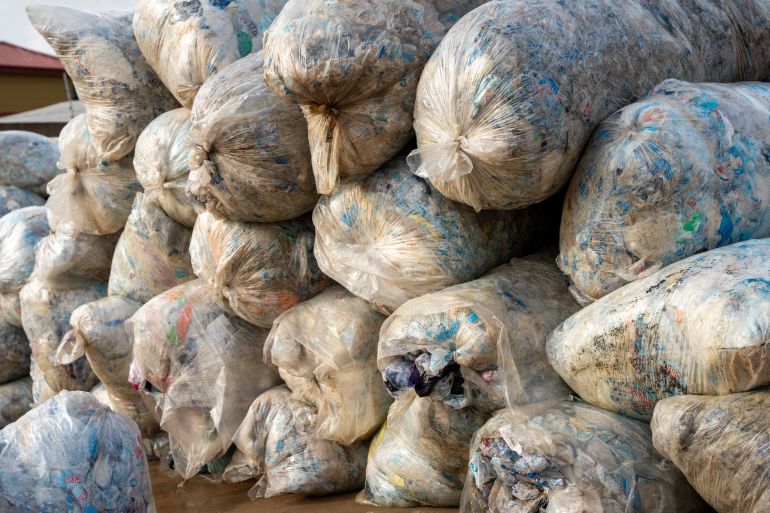Around 400 million tons of plastic waste are produced globally each year, more than the total weight of all the planet’s inhabitants.
Only 9% of it is recycled, and a study predicts that plastic production will triple globally by 2050.
The UN has been attempting to broker a global treaty on plastic waste since 2022. However, discussions continue to sour, particularly regarding the proposal to cap plastic production.
Petrostates, according to campaigners, are responsible for thwarting the negotiations on a treaty because their economies depend heavily on oil, the primary ingredient in plastics.
In the most recent attempt to reach an agreement, the UN is holding a meeting this week in Switzerland. However, it could take years before the delegations find a way to reduce the amount of plastic produced worldwide.
In the interim, organizations like the World Bank are looking for alternative solutions in the market. Plastic offsetting is one of them.
What exactly is plastic offsetting? Is it effective? And what do programs like this mean for disadvantaged populations that depend on plastic waste to support their income?
How does credit management work and what is plastic offsetting?
Similar concepts to carbon credits are used to create plastic credits.
Companies that use carbon credits can pay a carbon credit to have their emissions “cancelled out” by funding reforestation initiatives or other projects that will “sink” their carbon output.
The company receives a carbon credit for every tonne of carbon removed. An airline can explain to customers that their flight is “carbon neutral” in this way.
A similar model uses plastic credits. The biggest plastic polluters in the world can pay a plastic credit bureau to collect and recycle the material.
One plastic credit is given to a polluter who pays for one tonne of plastic to be collected.
If a polluter purchases the equivalent number of plastic credits to its annual plastic output, it might be given the status of “plastic net zero” or “plastic neutral.”
How effective is plastic offsetting?
Plastic credits are content, much like carbon credits.
Carbon markets already have a value of hundreds of millions of dollars per year, with a potential billions of dollars in their hands.
However, a nonprofit newsroom SourceMaterial discovered that only a small percentage of the nearly 100 million carbon credits actually reduce emissions in 2023.
Companies are making false claims, and then they trick customers into believing they can fly guilt-free or purchase carbon-neutral goods without having to pay anything, according to US carbon trading expert Barbara Haya at the time.
Plastics might experience the same fate. Only 14% of PCX credits went toward recycling, according to an analysis by SourceMaterial of the first plastic credit registry in the world, Plastic Credit Exchange (PCX).
In a process known as “co-processing,” which releases thousands of tonnes of CO2 and toxins linked to cancer, most of the plastic was burned as fuel in cement factories, while businesses that had purchased credits with PCX were receiving “plastic neutral” status.
Co-processing is done under controlled circumstances, according to a PCX spokesperson who spoke at the time.
The World Bank is now pointing out the use of plastic credits as a remedy.
The World Bank released a $100 million bond in January of last year in connection with the plastic credit projects being supported by the Ghana and Indonesian initiative Alliance to End Plastic Waste.
A senior environmentalist from the World Bank stated at the UN talks in December last year that plastic credits were an “emerging result-based financing tool” that could help fund projects that “reduce plastic pollution.”
What are plastic credits thought of by businesses?
At the UN, manufacturers, petrostates, and credit project owners have all fought for market alternatives, including plastic credits.
The Alliance to End Plastic Waste in Ghana and Indonesia, two of which produce plastic domestically and import plastic from abroad, is made up of the oil-rich ExxonMobil and petrochemicals giant LyondellBasell and Dow Chemical.
Given the “benefits of plastics,” those companies are also members of the American Fuel and Petrochemical Manufacturers, a lobby group that has warned the UN that it does not support production caps or bans.
What are the opinions of critics and the affected neighborhoods?
Plastic offsetting is described as a “game of greenwashing,” according to professor of human resource management at the University of Toronto Anil Verma, who has studied waste pickers in Brazil.
Verma contends that compensating allows polluters to claim they are addressing the waste problem without sacrificing production or profits.
St. Andrews University in Scotland’s Patrick O’Hare, an academic who has been a part of the UN plastic treaty negotiations, expressed concern over the increasing importance that plastics credits are receiving.
Plastic credits are being promoted in some circles, he continued, “despite the lack of proven success stories to date” and the “evident problems with the carbon credit model on which it is based.”

Even the biggest companies in the world have shied away from plastic credits.
Nestle, which previously purchased plastic credits, stated last year that it was unsure of their usefulness in their current form.
According to reports, Nestle and Coca-Cola both claim to be “not convinced” that “extended producer responsibility” schemes are necessary.
The World Bank plans to increase its support for plastic offsetting, calling it a “win-win with the local communities and ecosystems that benefit from less pollution.”
Some of Ghana’s poorest people make a living by recycling plastic waste.
Funds for offsetting, according to Johnson Doe, the head of a local waste pickers’ group in Accra’s capital, would be better spent on helping out local waste pickers.
Doe prefers to see investment turn into plastic credits, as opposed to having his association officially recognized and funded. He claims that they are a “false solution.”
This article was created in collaboration with SourceMaterial .
Source: Aljazeera

Leave a Reply